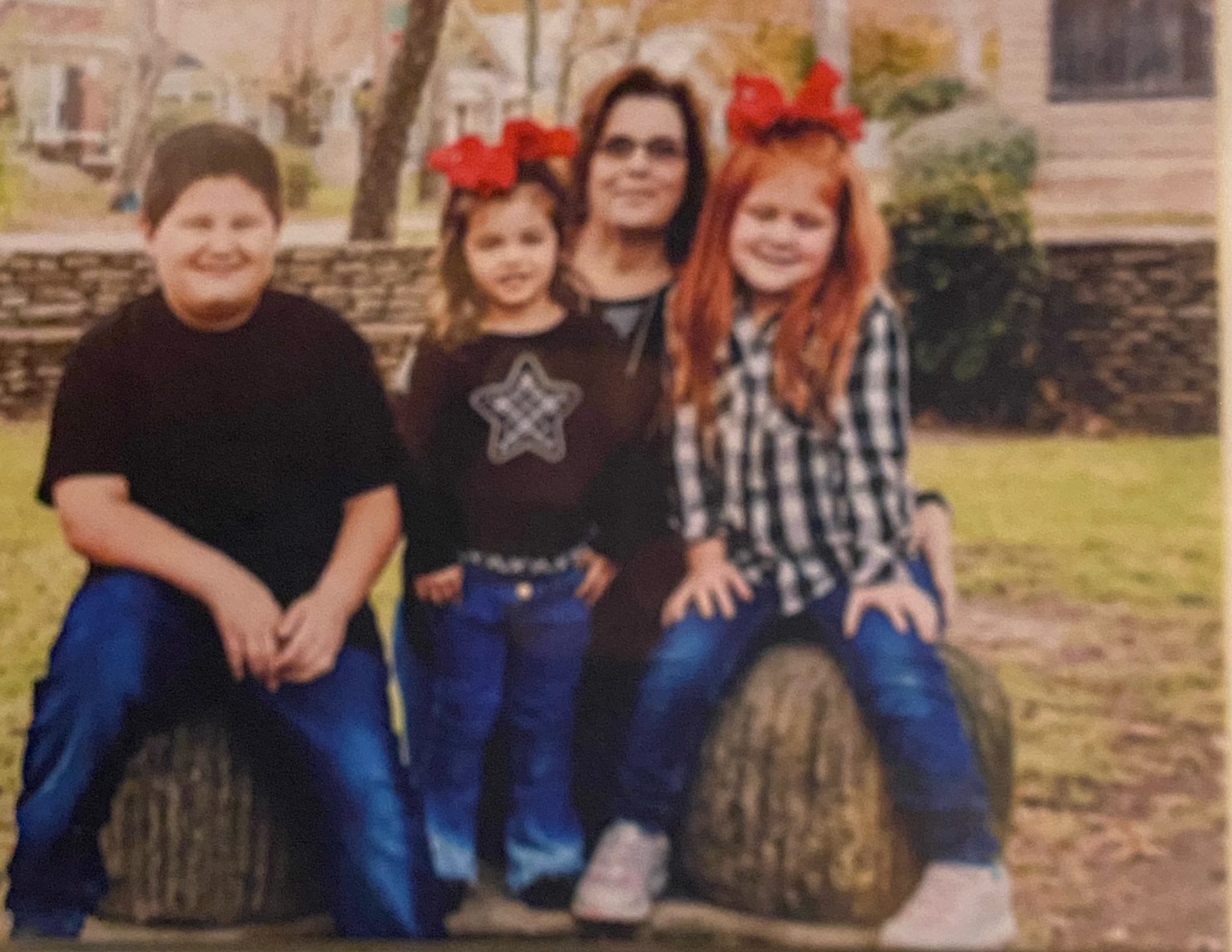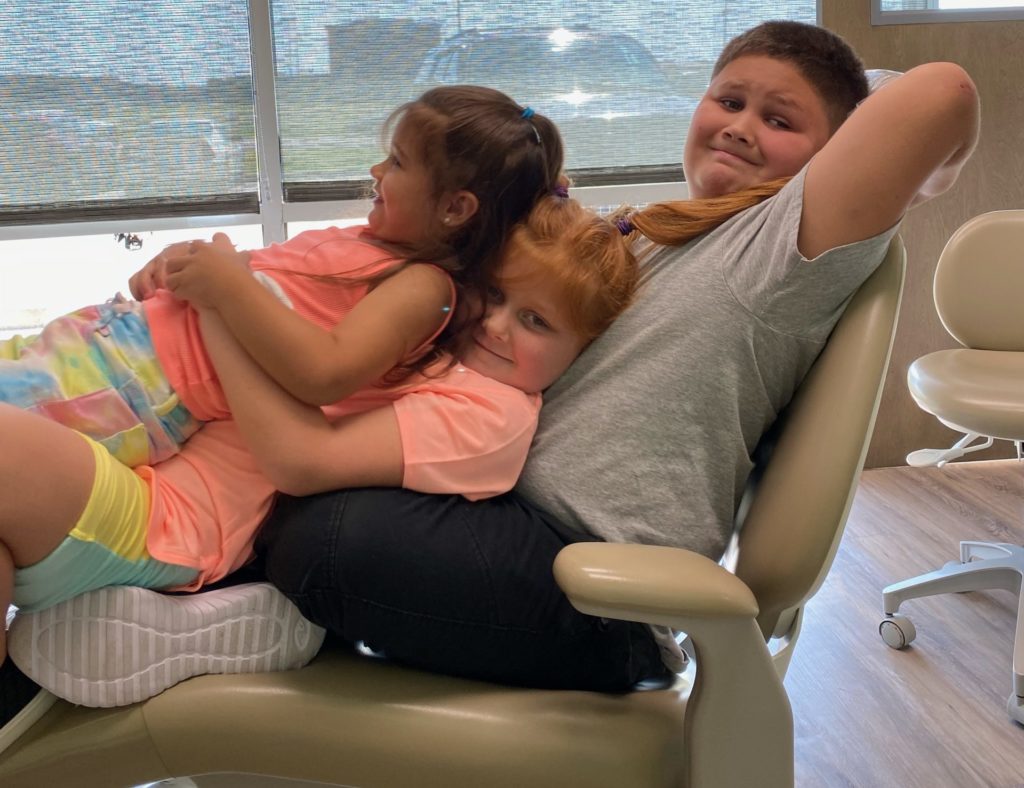Hear My Voice is a series of first-person testimonies from people with lived experience with the foster care system, created from in-depth interviews. This is Kalynda’s story, as told to Emma Ledford.
Kalynda adopted her three children, siblings Ryan, Raeleigh and Raychel, over the course of 10 years. The three share the same birth mother. Raeleigh, Ryan and Kalynda’s great niece share the same birth father, which is how Kalynda ended up becoming a core part of their lives. Thank you, Kalynda, for sharing your story!

I always wanted to be a mom. I was blessed with three beautiful children—but not in the way I expected. Looking back, at all the ups and downs, I wouldn’t change a thing.
It all started when I got a call from my niece. She let me know that 6-week-old Ryan’s mom and dad, who were in trouble with the law, had abandoned him. She said CPS would put him in foster care unless we were able to take him. She knew we wanted kids, so we scrambled to get our house ready for a baby. Less than a week later, CPS dropped Ryan off. Since we were an informal kinship placement and didn’t go through the CPS licensing process, they pretty much left us to our own devices to care for a newborn. I’ll come back to this later, but it’s important for you to know.
We went through an 18-month-long legal process, then Ryan’s mom and dad signed over their rights. Then we officially adopted him. I remember we spent all day in court the day it officially happened.

A couple years later, CPS called us to let us know Raeleigh was born and their parents were, once again, in trouble. We fought to keep her and her brother together as full-blood siblings, and as part of that process, we went through the state and got formally licensed as a kinship foster home before taking her in. We adopted her when she was a little younger than a year.
Then another year passed, and long story short, things didn’t go so well with my marriage, so I ended up getting a divorce. CPS called me and told me about Raychel, and I said, “Well if you don’t mind me being a single mom, I would love to have her.” They called me on a Thursday, the day she was born. I went to the hospital that Friday and sat with her to bond, comfort and feed her—show her that she was already so loved. CPS brought her to me that Sunday; I had to wait until she was five pounds.
Today, Ryan is 10, Raeleigh is 7 and Raychel is 3 ½. I love them more, and learn from them more, every single day. Ryan and Raychel look like their mom. Raeleigh, on the other hand, looks just like my great niece and has flaming red hair, which they say comes from a great aunt on dad’s side. They are all so smart, and I’m so proud and impressed by them.

It’s not easy raising three kiddos as a single parent. Remember earlier when I said I’d come back to the adoption process we had with Ryan? Well, something I’m specifically struggling with that I didn’t see coming when I adopted him all those years ago is that, because he was never formally in foster care, he doesn’t have access to the same benefits as the girls. He doesn’t get free state college or Medicaid, and I don’t get any adoption-related financial assistance from the state. As you can imagine, that’s weighing on me in more ways than one.
Navigating conversations around their birth parents can also be challenging. I know they will wonder, and that it’s human nature for them to do so. I’ve already had some conversations, more so with Ryan. When the girls get older, I’ll talk with them, too. Everyone wants to know, and deserves to know, where they come from.
I haven’t talked much about my kids’ family of origin, why their rights were terminated or why they’re not currently in their lives, and honestly that’s for a reason. It’s a complicated situation to say the least, and right now we’re not in communication. I haven’t cut them off—they know how to reach me. I know there are plenty of birth parents who give up their rights, but are then able to later have a safe, positive and healing relationship with their kids. I do believe that they can change. If they do come around one day, I’ll be here ready to talk, but like always, I’ll put my children’s physical and emotional safety first. It’s my duty as their mother, and I take it seriously.

Based on my experience, if there’s one thing about the system I could change, it would be better communication: making sure families really understand the foster care and adoption process, know what resources are available from the state, and how to access them. I’m still fighting for Ryan to get benefits, and I don’t know that he will. If the requirements had been better communicated to me at the time, we might have been able to work things out earlier, or even prevent the problem in the first place. This advice applies to CASA volunteers as well: not only do the kids need you, but their families need you! Foster families, adoptive families, blood families… they all need your help understanding and navigating the system that is currently affecting them and will continue to affect them even after its involvement ends.
If you’re thinking of stepping into this journey and adopting a child, the most important thing is that you need to make sure you’re ready. Really search your heart and make sure it’s what you really want. Like I have been, you will be tested, both by the kiddo and by the system. Kids who’ve been in foster care have been through so much, so early in their lives. They need someone to love them unconditionally… and I mean unconditionally. It will be hard, but it will be worth it—you will learn to love like you never knew you could love!